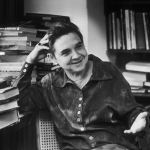In the shadow of the temple my friend and I saw a blind man sittingalone. And my friend said, “Behold the wisest man of our land.”
Then I left my friend and approached the blind man and greeted him.And we conversed.
After a while I said, “Forgive my question; but since when has thoubeen blind?”
“From my birth,” he answered.
Said I, “And what path of wisdom followest thou?”
Said he, “I am an astronomer.”
Then he placed his hand upon his breast saying, “I watch all thesesuns and moons and stars.”
Then I left my friend and approached the blind man and greeted him.And we conversed.
After a while I said, “Forgive my question; but since when has thoubeen blind?”
“From my birth,” he answered.
Said I, “And what path of wisdom followest thou?”
Said he, “I am an astronomer.”
Then he placed his hand upon his breast saying, “I watch all thesesuns and moons and stars.”






Comment form: